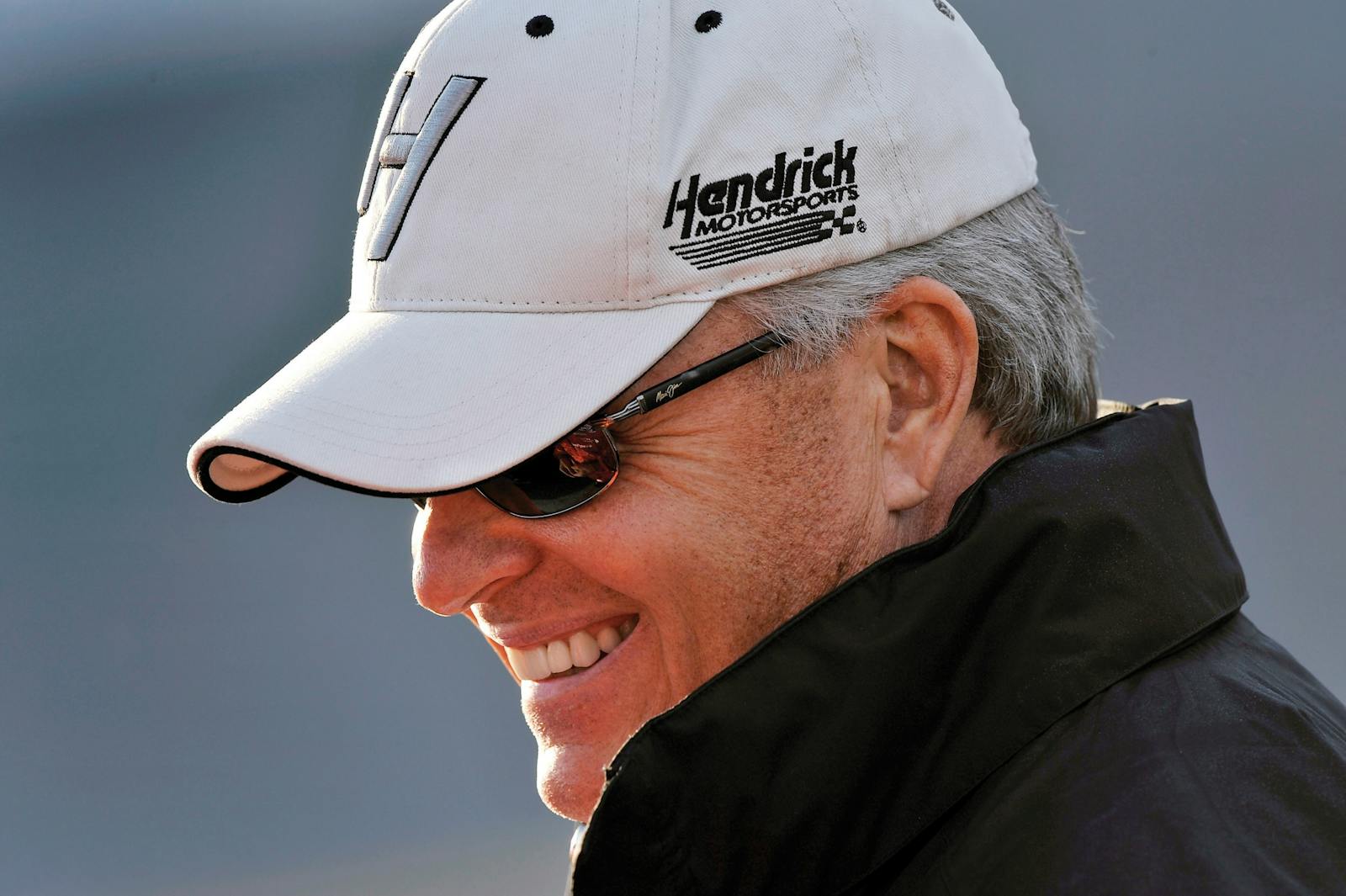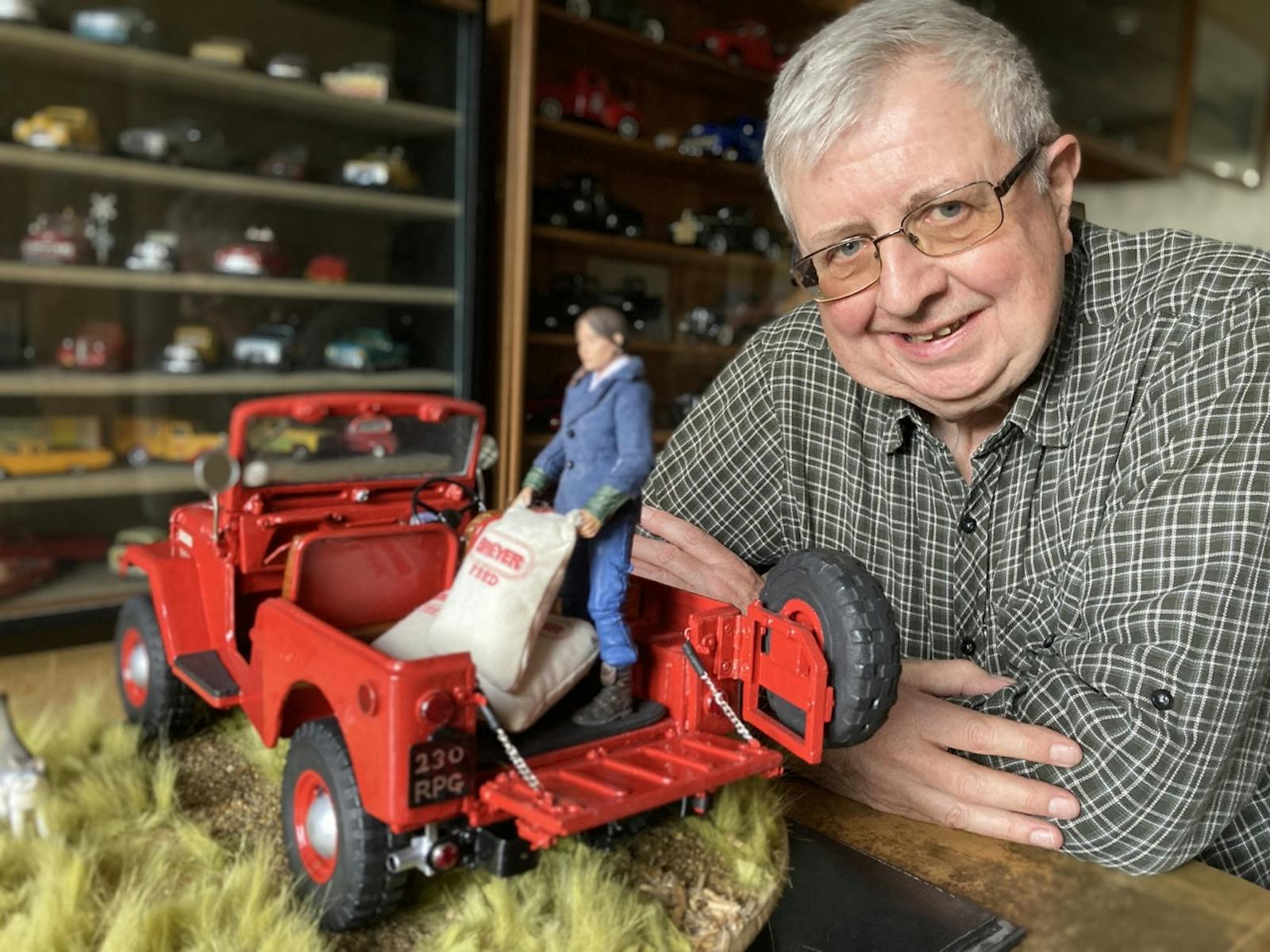Meet the unsung heroes of Goodwood SpeedWeek
Goodwood SpeedWeek may have been held behind closed doors but the event proved to be a celebration of motor racing and motoring in its purest form, covering the sport from pioneering early 20th century steeds, right through to the current and future age, with classics, recent Formula One cars, Le Mans winners, modern supercars, and Formula-E racers—most adhering to the mantra flat out and fearless.
The greatest cars and drivers that were due to be attending Goodwood’s signature annual motor sport events in 2020—the Members’ Meeting, Festival of Speed and Revival—had to be combined into one gala of motor racing greats. Yet none of their exploits would be possible without the exhaustive planning, preparation, and hard work that goes on behind the scenes ahead of every race, be it at Goodwood SpeedWeek or any other national or international motor sport event.
Behind the pairing of big-name drivers and beneath the multi-million dollar machines that rub door handles and smoke rubber are the ‘unsung heroes’ of motor racing. At SpeedWeek, Hagerty spoke to six competition car technicians and preparers, working on a broad variety of vehicles, from pre-war Bentley specials with competition history at storied sites such as Brooklands, through to the team manager of Porsche GB’s current one-model Carrera Cup and Sprint Challenge race series.
Our selection of unsung heroes reveals what goes on behind the glitz and glamour to ensure the show goes on.
Roy Gillingham

Classic car restorer and race preparer Roy Gillingham has a long association with Goodwood, first being taken to the famous motor circuit by his father at the impressionable age of ten, when the West Sussex track was active first time around. He even went on to volunteer as a junior marshal at Goodwood, and still treasures a collection of badges and race programs from those earlier pre-1966 closure race meetings.
In later years, Roy became more actively involved in motor sport himself, buying a new (and rare) V8-engined Triumph TR7 in 1981 and rallying the car, ultimately leading to his participation in the RAC Rally five times, up to his last RAC in 1990.
Although unplanned, Roy’s hobby eventually turned into a business, and he has been preparing race, road, and rally cars for other drivers for around 20 years now, specializing in early Lotus Elite and Elan models, but also branching out into other classics, including Ed Foster’s ex-works BMC 1964 MG B, which was built by the Competitions Department in Abingdon.
Roy got to know Ed and his historic MG via a fellow motoring journalist, and he’s enjoyed setting the car up for the inaugural Stirling Moss Memorial Trophy race, a race replacing the popular Goodwood Revival Kinrara Trophy and renamed to honor the outstanding British driver whose competitive racing career began and ended at Goodwood.
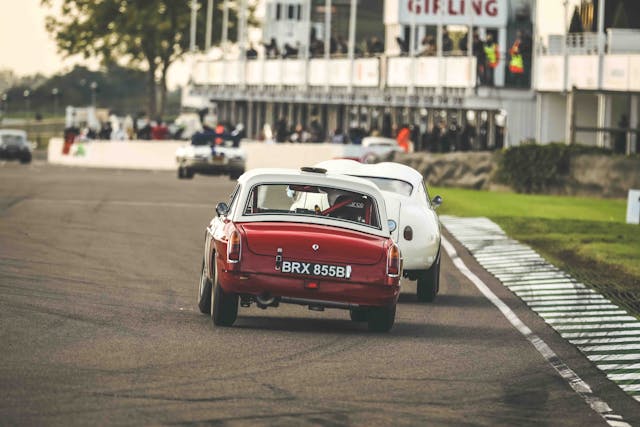
Through this process, Roy discovered that fine-tuning was required. “The MG B was a little too ‘pointy’ for Goodwood, so I changed the car’s set-up pre-SpeedWeek with revised front suspension and fitting a more substantial anti-roll bar.” The MG crossed the finish line a respectable 18th out of 24 starters, fighting against much quicker and more powerful competition.
What of obtaining MG B parts? “It wasn’t too strenuous, but I did also call upon a number of small, traditional engineering workshops that I use for specialist racing components, which I am keen to support to help ensure the ongoing use and enjoyment of older classic cars.”
As for his own personal motor sport highlights, Roy revealed, ”I have many happy memories, but I’ve had a few sleepless night too, worrying about the reliability of certain competition cars, as well as the abilities of a handful of drivers!”
Ben Mitchell
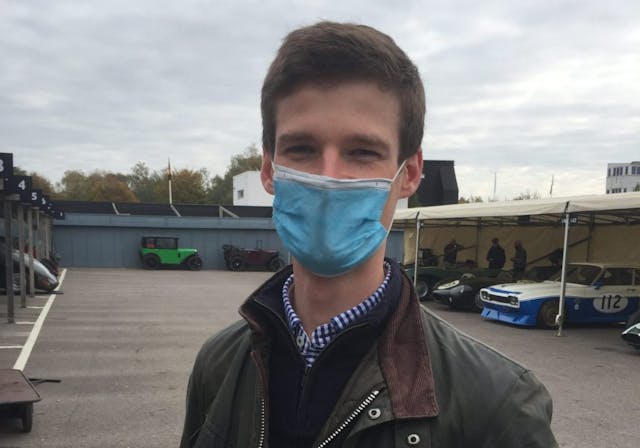
As with many others in the motor sport world, Ben Mitchell caught the bug from his father and grandfather, both racers, with Ben attending his first race meeting aged just ten days old. “When I was young, dad bought me a go-kart on the proviso I maintained it, and as I got older I would help out dad with his cars too.”
It proved to be a good grounding; Ben now works with William I’Anson, a fellow historic car racer, enthusiast, and dealer. Ben races, manages cars and teams, and still wields the spanner as well. He had his work cut out for him during SpeedWeek, preparing a very fast Ford Galaxie which went on to develop a sickly 427 V-8 engine.
“We made a late evening 175-mile dash from Goodwood to Tamworth to collect a spare V-8, returning to West Sussex and working until 3 a.m. to help install the new motor ahead of Sunday’s part-two St. Mary’s Trophy race, only for the second engine to fail as well! As you can imagine, it’s been a tad frustrating.”
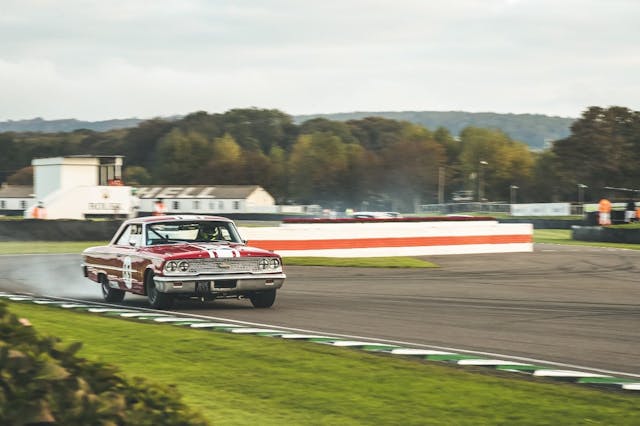
Despite these difficulties, Ben’s mantra remains plenty of planning, preparation, testing, and shake-downs—the latter proving tricky during the curtailed 2020 race season. “The spare Holman & Moody 427 engine had already been pre-prepared in readiness of any problems at Goodwood, but finding parts generally for racing Galaxies is increasingly tough, as the differences of the competition model over the standard Ford are chalk-and-cheese.”
Ben’s love of motor racing is readily apparent and contagious, with a personal highlight being a “right time, right place” unexpected drive in a Maserati 250F at the Nürburgring. “It was a real ‘pinch me’ moment.” There’s another element of Ben’s work that he enjoys, one he feels escapes the eye of the casual enthusiast. “I get a lot of satisfaction from the unseen research that goes into preparing, and possibly selling, a historically-important competition car, which is something the public never really gets to see or fully appreciate.”
Eughan McLeod

Studying as a three-module engineering apprentice at Southampton University, Eughan got started in the world of motor sport unintentionally. He responded to an advert on campus for a full-time student apprentice, working at West Sussex-based William Medcalf Vintage Bentley, the renowned specialist for prewar cars created by W.O. Bentley.
Starting in William Medcalf’s extensive workshops in January 2020, trainee Eughan is one of three mechanical engineering apprentices on a four-year scheme, with a three-month experience rotation to get a flavor of each main discipline, covering the broad principals of engineering, including machining in the engine room, lathe operating, workshop time, and race pit crew, ahead of settling on which area to specialize in.
Eughan has found his time at Medcalf to be widely varied. “It’s been a great experience so far, with full-on but strong learnings for life, working on over a dozen prewar Bentleys for use in wheel-to-wheel circuit racing, as well as preparations for endurance rallying, plus many other competition challenges.”
As well as working on William Medcalf’s famous historic 1936 Bentley Pacey Hassan Special during SpeedWeek—including overall maintenance, pre-race preparation, and managing the lap time board during the lively Goodwood Trophy race for 1930–51 Grand Prix and Voiturette cars—Eughan regularly focuses on keeping Medcalf’s vintage Bentley clients’ cars running.
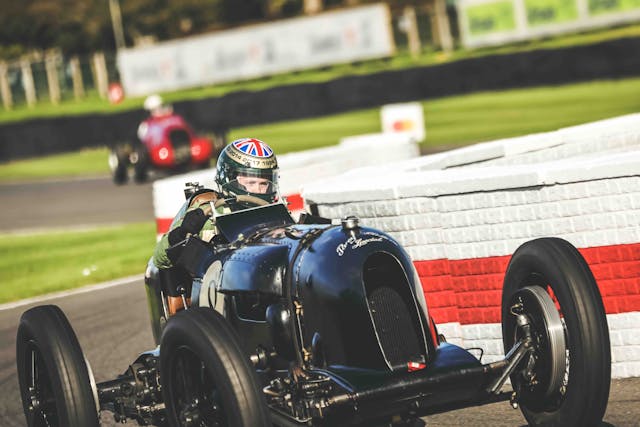
“Ahead of the SpeedWeek race, I managed to get some useful practice in, spannering at the Goodwood circuit a few weeks earlier at a special Benjafield’s Double-12 race for prewar Bentleys, including a 20-lap shakedown track test, which was invaluable to help sort out a fuel leak, as well as sorting out some wheel balancing issues, measuring fuel consumption, coolant, and general maintenance ahead of race scrutineering. During the race an exhaust bracket failed too, which I had to weld up in record time as every second counts!”
Sourcing parts for Bentleys that are almost 100 years old can be very tricky, so many components are made in-house by the dedicated Medcalf team, including a full testing process.
Eughan sums up his personal highlights: “Finishing a car and seeing it surviving the race and successfully cross the finish line is very rewarding for me and the whole of Medcalf. Race fans possibly may not realize the huge amount of preparation and fine-tuning that goes into getting a car prepped ahead of each race.”
How, we wonder, do clients treat their Bentleys in competition? He couldn’t possibly comment, but most seem to survive everything that’s thrown at them, thanks in no small part to Eughan and the Medcalf team.
Philip Venables
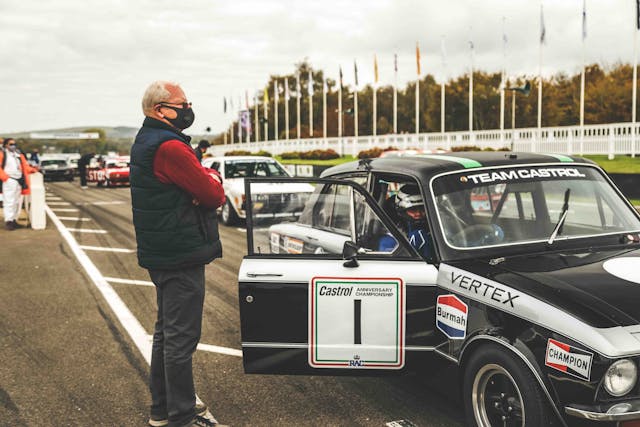
Philip Venables grew up with engine oil in his veins, his father running a pre-war Rolls-Royce 20/20 in his native Australia. He began his own motorsport career rallying an old Volvo 120 Amazon “down under” before moving over to the UK in the early 1960s, where he bought a 1930s MG to compete in club racing, plus an everyday 1928 Crossley 17.
For the past 25 years or so, Philip has been a freelance spanner man, preparing and running various competition cars for private owners and teams, as well as scrutineering at historic race meetings and competing in quite a few himself. “A personal highlight would have to be the 2002 Le Mans Classic race when I got behind the wheel of a scarce prewar Alta that I prepared and got to drive in four races, with the bonus of being paid to do it!”
For SpeedWeek, Philip fettled a handful of cars, including a Jaguar XJR-15, plus a familiar black Broadspeed Triumph Dolomite Sprint—a Goodwood favorite that has contested a number of Gerry Marshall Trophy saloon car races at the Goodwood Members’ Meeting.
Owned by the “gentleman driver” Lindsay brothers, the Dolomite is one of a number of interesting collector competition cars that Philip looks after for the family, dating back to a Jaguar D-Type owned by their father.
In terms of the effort that goes into getting a car ready for a race meeting, Philip has faced his fair share of challenges. “I had to rebuild the whole of the Triumph’s transmission after an outing at Thruxton in late August, as well as fitting new brakes, tires, transponders, plus a full and comprehensive motor check and test.”
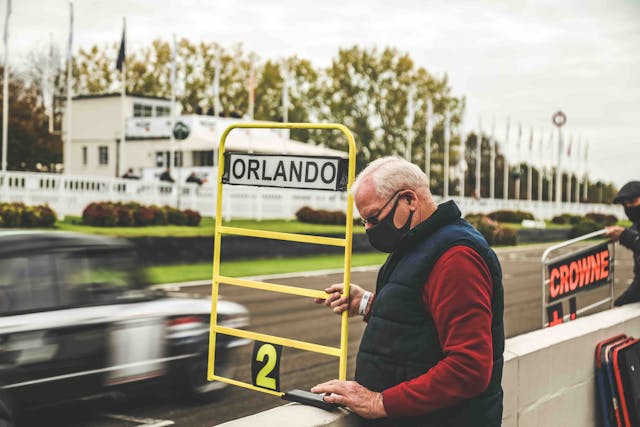
Getting parts for “regular” road-going Dolomite Sprints is improving all the time via many model specialists, but for highly-strung competition examples, it’s not so easy, with Philip (and others) now using reverse engineering to cast new engine blocks, using a laser-printed wax mold.
“Modern technology is great,” says Philip. “I increasingly use 3D printing now, as if a part doesn’t exist, it can now be made. He adds: “The quality of some modern cast materials is not so good these days though, with the exception of the quality of aluminum which has improved immensely.”
For Philip, time constraints are often the greatest enemy, particularly during a “normal” busy race season, when hours can quickly evaporate. He also says that keeping both car and driver in-tune and focused can be a challenge, with some keen owner/drivers simply too busy to put in the pre-race track time that they really should.
Eddie Corr
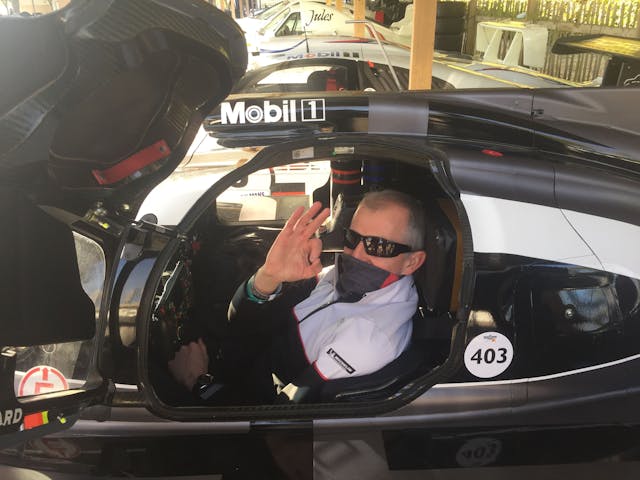
Confirmed gearhead Eddie Corr is a long-time motorsport devotee, competing in motocross at national level in Northern Ireland in his younger days, ahead of getting his engineering degree at Loughborough University and then moving straight into motor racing as a career, both in the UK and internationally.
Unlike some of the other vehicle preparation specialists we spoke to at Goodwood, Eddie’s role as Porsche GB’s team motorsport manager—a position he’s held for the past decade—doesn’t involve him picking up a spanner, but rather a laptop, which he plugs into the competition Porsche’s onboard diagnostic system for fault finding and analysis.
Getting ready to run the competition Porsches for their timed runs during SpeedWeek, Eddie is taking things as seriously as any other race meeting. “We’re treating this Goodwood event the same as any other race meeting, with plenty of preparation and a strategy for the tires, fuel, the drivers, and all other eventualities, the only change being that we won’t be using tire warmers.”
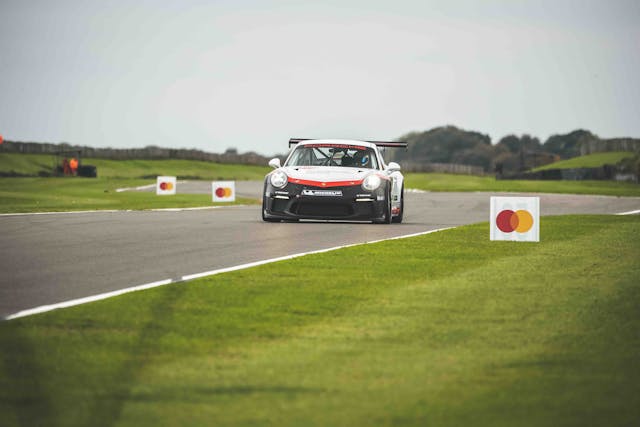
Although it was his first time actually working at a Goodwood race meeting, Eddie has attended the West Sussex venue’s events as a spectator many times, with the sights, sounds, and smells of returning to a race track in this disrupted year rated as a personal highlight.
“I’d say the challenges of racing that spectators might not consider are things such as temperature management; it’s a vital, and often overlooked, consideration. If you consider a cold transmission and tires in a Porsche 917—items that require considerable and careful warming-up, especially for the former, as 917 gearboxes are in very short supply and expensive—then you need to follow procedures.”
Happily, says Eddie, around 80 percent of professional drivers are blessed with mechanical sympathy. As for the remaining 20 percent, he won’t name names …
Ben Swift
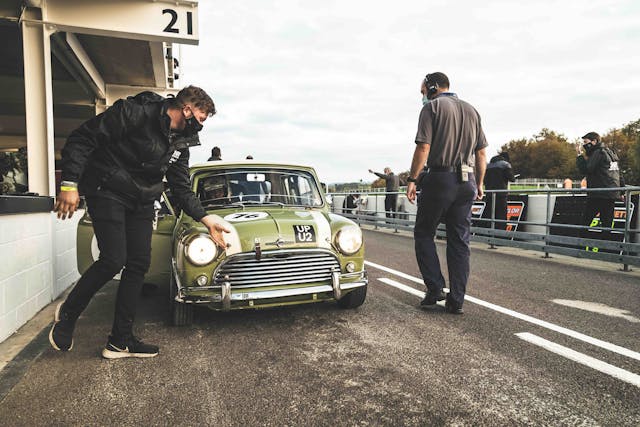
Being the son of Nick Swift, the enthusiastic Mini specialist and racer, it was inevitable that Ben would love cars and work for the family firm, Swift Tune.
Before surrounding himself with Issigonis Minis though, Ben Swift cut his teeth with the Motorbase BTCC team, gaining valuable experience in the field from a different perspective. He also raced, beginning with the Ford Fiesta Junior race series, created for 14- to 16-year-old drivers, but only got to test a BMC Mini for the very first time this year.
In his time working with his father, Ben has gone from sweeping the workshop floor at Swift Tune to managing its racing team and running a number of classic racing Minis. The all-Mini race, held at the 2019 Goodwood Members’ Meeting to mark the 60th anniversary of the influential Issigonis city car, was “a very special and emotional moment for me and the rest of the team, because Dad won the race.”

Ben says he lives and breathes his job night and day, “working long, hard hours, and always striving to be the best.” Planning for events such as SpeedWeek begin months ahead of the events, with all the appropriate spares gathered and checked and the experienced team of mechanics fully briefed for their roles. “It can get stressful and it’s hard work, but it’s all great fun, and potentially hugely rewarding if and when we win.”
Although people think a Mini is a simple car, Ben points out there’s more to the racing versions than meets the eye. “There is so much more to Minis than most appreciate, and like any old car, they need a lot of time, work, and attention to make them winning machines.”

